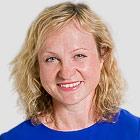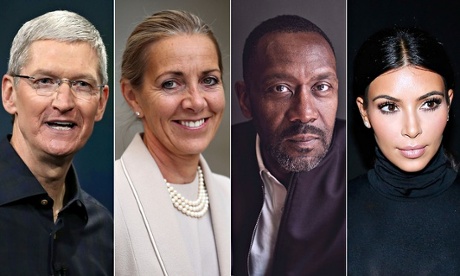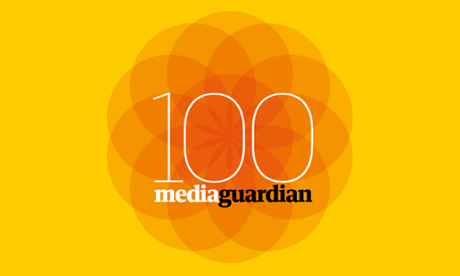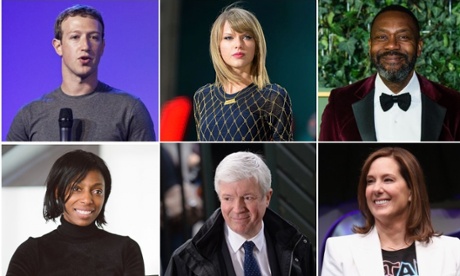Mark Zuckerberg has returned to the top of the Guardian’s annual power list, the MediaGuardian 100, after a year in which Facebook, the social network he founded, was used by 1 billion people in a single day.
The list confirms the growing influence of US technology groups, with Google co-founder Larry Page and the Apple chief executive, Tim Cook, also claiming top spots.
The number of women in the list rose by more than half on last year, to 31. With singer Taylor Swift and media regulator Sharon White in the top 10, the percentage of women judged by our panel to wield cultural influence, economic clout and political power has grown from 20% last year.
Facebook’s reach – Zuckerberg trumpeted the fact that one in seven people on Earth used the social network in August – pushed its founder above last year’s winner, Google’s Larry Page, for the first time since 2011.
As well as organic growth, Facebook expanded in 2015 through its subsidiaries such as the flourishing picture-led Instagram and messaging platform WhatsApp, which are popular with a younger demographic, and the launch of its Instant Articles. In the words of one judge: “It’s hard to argue with Facebook’s domination over everything.” The 31-year-old Zuckerberg also tops the list of media moguls under 40.
George Osborne, the UK chancellor, makes an appearance for the first time at number four having redrawn Britain’s media landscape through the introduction of the so-called “Google tax” and forcing the BBC to pay for free TV licences for the over-75s. He is also running the privatisation rule over Channel 4.
Other new entrants include Sharon White, chief executive of media regulator Ofcom, at number 10, and the singer Adele, whose new album has shattered records.
Swift, one of the biggest-selling artists on the planet, is the highest-ranking woman, at number eight, after she shamed Apple into paying artists for their work during the trial period of its streaming music service this summer. It was a triumph that many media companies, including newspapers, would love to emulate.
Other women on the list include Rebekah Brooks – the chief executive of News UK, which oversees newspapers including the Sun and the Times – and the controller of BBC1, Charlotte Moore.
The list is still overwhelmingly dominated by white men, however, with just eight non-white members of the list. Trevor Phillips, a former chair of the Equality and Human Rights Commission and judge both this year and in 2001, when the Guardian started compiling its annual power list, said the media industry, particularly in the UK, was hidebound by a “leadership cadre which consists of people of the same colour and background”.
Although tech entrepreneurs dominate the list’s upper echelons, the influence of on-screen talent has gained ground this year. Chris Evans, who holds the future of the BBC’s £50m Top Gear brand in his hands, is a re-entry; while James Corden makes an appearance after capturing US audiences with his The Late Late Show with James Corden on CBS.
Research into the educational backgrounds of the top 100 suggest big national differences between the US and UK. A slightly greater percentage of Brits, particularly at the BBC, went to fee-paying schools compared with the Americans on the list.
In the US it appears success in the media is more dependent on whether an Ivy Plus college is on the resumé rather than an esteemed fee-paying school. Ivy Plus colleges are said to be those of the “ancient eight” – Brown, Columbia, Cornell, Dartmouth, Harvard, Penn, Princeton and Yale – as well as other prestigious technology colleges, such as MIT.
This MediaGuardian 100 list is the 15th to be published since 2001. Based on political, cultural and economic influence, it was compiled with the help of 14 industry experts and is intended as a snapshot of media power today. Although the list has become increasingly global in recent years, along with the industry, it is still dominated by people whose first language is English.
The top 10
1 Mark Zuckerberg (2 last year)
Founder, chief executive, Facebook
2 Larry Page (1)
CEO, Alphabet; co-founder, Google
3 Tim Cook (3)
Chief executive, Apple
4 George Osborne (new entry)
UK chancellor
5 Rupert Murdoch (7)
Co-chair, 21st Century Fox, executive chair, News Corp
6 Tony Hall (4)
Director general, BBC
7 Jeff Bezos (5)
Founder, CEO, Amazon
8 Taylor Swift (right) (10)
Singer and songwriter
9 Paul Dacre/Martin Clarke (9)
Editor-in-chief, Associated Newspapers (Dacre); publisher, Mail Online (Clarke)
10 Sharon White
(new entry)
Chief executive, Ofcom












